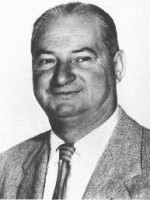Bobby Jordan est un Acteur Américain né le 1 avril 1923 à Harrison (Etats-Unis)

Robert "Bobby" Jordan (April 1, 1923 – September 10, 1965) was an American actor, born in Harrison, New York, most notable for being a member of the Dead End Kids, the East Side Kids and The Bowery Boys.
Jordan was a talented toddler and by the time he was six years old, he could sing, tap dance and play the saxophone. At the age of four, he was working in an early film version of A Christmas Carol.
His mother took him to talent shows in and around Harrison, New York. He also modeled for newspaper and magazine advertisements, and appeared in short films and radio programs. In the late 1920s, his family moved to the upper west side of Manhattan. In 1929, he was cast as Charles Hildebrand in the 1929 Broadway play, Street Scene.
Dead End Kids and East Side Kids
Though he was the youngest, Jordan was the first of the boys who made up the Dead End Kids to work in films, with a role in a 1933 Universal short. In 1935, he became one of the original Dead End Kids by winning the role of Angel in Sydney Kingsley's Broadway drama Dead End, about life in the slums of the east side of New York City. The play was performed at the Belasco Theatre, and ran for three years with over 600 performances. He appeared for the first season and the beginning of the second, but left in mid-November 1936. He returned in time to join the others in 1937 in Hollywood, California, to make the movie version of the play, starring big names such as Humphrey Bogart, Joel McCrea, Sylvia Sidney, and Claire Trevor.
Following the making of Dead End, Jordan found himself "released" from his contract at Goldwyn, and subsequently appeared at Warner Brothers with the rest of the Dead End Kids. After one year, Warners released most of them, but kept Leo Gorcey and Jordan as solo performers. Jordan appeared (as "Douglas Fairbanks Rosenbloom") in Warner's Damon Runyon comedy A Slight Case of Murder (1938), and at Metro-Goldwyn-Mayer in Young Tom Edison (1940).
In 1940, Jordan appeared in the film Military Academy and accepted an offer from producer Sam Katzman to star in a new tough-kid series called "The East Side Kids." Leo Gorcey soon joined him, then Huntz Hall, and the trio continued to lead the series through 1943, when Jordan entered the United States Army during World War II as a foot soldier in the 97th Infantry Division. He was subsequently involved in an elevator accident that forced him to have surgery to remove his right kneecap.
Later career and personal life
When Jordan returned to films in 1945, he found that his former gang-mates Gorcey and Hall were obtaining the lion's share of both the content and the salary for the new Bowery Boys film series. Dissatisfied with his background status, he left the series after eight entries, and made only a few films thereafter.
On July 1, 1957, Jordan played Bob Ford, the assailant of Jesse James, in the Dale Robertson television series, Tales of Wells Fargo. The episode ends some two months before Ford assassinated James in the latter's residence in St. Joseph, Missouri. Hugh Beaumont appeared in the episode as Jesse James.
In subsequent years, Jordan worked as a bartender, a bad choice for him considering his alcoholism. He worked to support his family as a door-to-door photograph salesman and as a roughneck for an oil driller.
Death
In 1957, Jordan and his wife divorced. On August 25, 1965, he entered the Veterans Hospital in Sawtelle, California, for treatment of cirrhosis of the liver. He died a couple weeks later at the age of forty-two. Of his former Dead End Kid and East Side Kid co-star, Leo Gorcey once observed, "Bobby Jordan must not have had a guardian angel."
One of his last performances was in a Bonanza episode, "The Many Faces of Gideon Flinch" where he played one of Bullet Head Burke's right hand men.
Source : Wikidata
Bobby Jordan

- Infos
- Photos
- Meilleurs films
- Famille
- Personnages
- Récompenses
Nom de naissance Robert Jordan
Nationalité Etats-Unis
Naissance 1 avril 1923 à Harrison (Etats-Unis)
Mort 10 septembre 1965 (à 42 ans) à Los Angeles (Etats-Unis)
Nationalité Etats-Unis
Naissance 1 avril 1923 à Harrison (Etats-Unis)
Mort 10 septembre 1965 (à 42 ans) à Los Angeles (Etats-Unis)
Biographie
Early life and careerJordan was a talented toddler and by the time he was six years old, he could sing, tap dance and play the saxophone. At the age of four, he was working in an early film version of A Christmas Carol.
His mother took him to talent shows in and around Harrison, New York. He also modeled for newspaper and magazine advertisements, and appeared in short films and radio programs. In the late 1920s, his family moved to the upper west side of Manhattan. In 1929, he was cast as Charles Hildebrand in the 1929 Broadway play, Street Scene.
Dead End Kids and East Side Kids
Though he was the youngest, Jordan was the first of the boys who made up the Dead End Kids to work in films, with a role in a 1933 Universal short. In 1935, he became one of the original Dead End Kids by winning the role of Angel in Sydney Kingsley's Broadway drama Dead End, about life in the slums of the east side of New York City. The play was performed at the Belasco Theatre, and ran for three years with over 600 performances. He appeared for the first season and the beginning of the second, but left in mid-November 1936. He returned in time to join the others in 1937 in Hollywood, California, to make the movie version of the play, starring big names such as Humphrey Bogart, Joel McCrea, Sylvia Sidney, and Claire Trevor.
Following the making of Dead End, Jordan found himself "released" from his contract at Goldwyn, and subsequently appeared at Warner Brothers with the rest of the Dead End Kids. After one year, Warners released most of them, but kept Leo Gorcey and Jordan as solo performers. Jordan appeared (as "Douglas Fairbanks Rosenbloom") in Warner's Damon Runyon comedy A Slight Case of Murder (1938), and at Metro-Goldwyn-Mayer in Young Tom Edison (1940).
In 1940, Jordan appeared in the film Military Academy and accepted an offer from producer Sam Katzman to star in a new tough-kid series called "The East Side Kids." Leo Gorcey soon joined him, then Huntz Hall, and the trio continued to lead the series through 1943, when Jordan entered the United States Army during World War II as a foot soldier in the 97th Infantry Division. He was subsequently involved in an elevator accident that forced him to have surgery to remove his right kneecap.
Later career and personal life
When Jordan returned to films in 1945, he found that his former gang-mates Gorcey and Hall were obtaining the lion's share of both the content and the salary for the new Bowery Boys film series. Dissatisfied with his background status, he left the series after eight entries, and made only a few films thereafter.
On July 1, 1957, Jordan played Bob Ford, the assailant of Jesse James, in the Dale Robertson television series, Tales of Wells Fargo. The episode ends some two months before Ford assassinated James in the latter's residence in St. Joseph, Missouri. Hugh Beaumont appeared in the episode as Jesse James.
In subsequent years, Jordan worked as a bartender, a bad choice for him considering his alcoholism. He worked to support his family as a door-to-door photograph salesman and as a roughneck for an oil driller.
Death
In 1957, Jordan and his wife divorced. On August 25, 1965, he entered the Veterans Hospital in Sawtelle, California, for treatment of cirrhosis of the liver. He died a couple weeks later at the age of forty-two. Of his former Dead End Kid and East Side Kid co-star, Leo Gorcey once observed, "Bobby Jordan must not have had a guardian angel."
One of his last performances was in a Bonanza episode, "The Many Faces of Gideon Flinch" where he played one of Bullet Head Burke's right hand men.
Le plus souvent avec
Filmographie de Bobby Jordan (45 films)
Acteur

The Man Is Armed (1956)
, 1h10Réalisé par Franklin Adreon
Origine Etats-Unis
Genres Drame, Policier
Acteurs Dane Clark, William Talman, Barton MacLane, Robert Horton, Richard Benedict, Fredd Wayne
Rôle Thorne (as Bob Jordan)
Note58%





This script must be run from the command line

The Eddie Cantor Story (1953)
, 1h55Réalisé par Alfred E. Green
Origine Etats-Unis
Genres Drame, Biographie, Musical
Thèmes Musique
Acteurs Keefe Brasselle, Marilyn Erskine, Aline MacMahon, Marie Windsor, Ann Doran, Gerald Mohr
Rôle Customer
Note57%





Raised by his grandmother on New York's East Side, 13-year-old Eddie sings while another neighborhood kid, Rocky Kramer, and his gang pick pockets. Eddie is sent by Grandma Esther to a boys camp, where he entertains the others with his songs and routines.
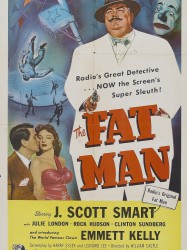
The Fat Man (1951)
, 1h17Réalisé par William Castle
Origine Etats-Unis
Genres Drame, Thriller, Noir, Policier
Acteurs J. Scott Smart, Julie London, Rock Hudson, John Russell, Clinton Sundberg, Jayne Meadows
Rôle Bellhop (uncredited)
Note61%





Portly amateur detective Runyan is hired by dental nurse Adams to investigate the unexplained murder of her boss. Suspicion falls on disappeared patient Clark, who had been helped by probable gangster Gordon. Runyan finds Boyd, Clark’s former lover and briefly his wife, who reveals that Clark had done time in jail. The police tell Runyan it was for robbery of half a million unrecovered dollars. In jail, Clark had a cellmate Deets, with whom he shared everything. On release, Deets had claimed Clark’s share of the loot from Gordon and had promised to eliminate Clark, whose corpse he left in a burnt-out truck. When he realised Clark had been having dental treatment, so his teeth could be identified, he killed first the unfortunate dentist and then the nurse as well. Runyan tracks him down and in a final shoot-out he meets his end.

Au carrefour du siècle (1947)
, 1h52Réalisé par Norman Taurog
Origine Etats-Unis
Genres Drame, Guerre, Biographie, Documentaire, Historique
Thèmes La mer, Transport, Aviation, Politique, Arme nucléaire
Acteurs Brian Donlevy, Hume Cronyn, Robert Walker, Audrey Totter, Tom Drake, Hurd Hatfield
Rôle Radioman on Tinian Receiving A-Bomb Message
Note65%





Ce film raconte le développement du Projet Manhattan de son début aux bombardements atomiques d'Hiroshima et Nagasaki.
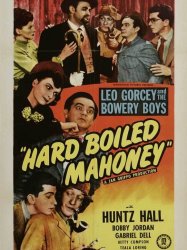
Hard Boiled Mahoney (1947)
, 1h3Réalisé par William Beaudine
Genres Comédie, Policier
Acteurs Leo Gorcey, Huntz Hall, Bobby Jordan, William Benedict, Gabriel Dell, David Gorcey
Rôle Bobby
Note61%





Sach (Huntz Hall) just lost his job as an assistant to a private detective, but he wasn't paid. Slip (Leo Gorcey) goes with him down to the detective's office to demand payment, but finds the office empty. A woman enters the office and mistakes Slip for the detective and convinces him to take on a case to find her sister after offering a $50 retainer.

News Hounds (1947)
, 1h8Réalisé par William Beaudine
Genres Comédie, Policier
Acteurs Leo Gorcey, Huntz Hall, Bobby Jordan, William Benedict, Gabriel Dell, David Gorcey
Rôle Bobby
Note62%





Slip is a copy boy for a newspaper, but dreams of having his own byline. Sach is an aspiring photographer for the same paper. The two of them come across a plot to fix sporting events and go undercover to expose the gangsters. Gabe, who is working for the gangsters, has a story of Slip's published which brings a libel suit against the paper because of lack of evidence. The lawsuit goes to trial, and at the last minute Gabe, who is feeling remorse, retrieves photographs that would back the story and gets them to Slip in time for them to be presented as evidence.

Bowery Buckaroos (1947)
, 1h6Réalisé par William Beaudine
Origine Etats-Unis
Genres Comédie, Policier, Western
Acteurs Leo Gorcey, Huntz Hall, Bobby Jordan, William Benedict, Gabriel Dell, David Gorcey
Rôle Bobby
Note60%





Louie is singing the song "Louie the Lout" about his days in the old west to the boys in the Sweet Shop. All of a sudden a man arrives on horseback and Louie hides from him in the back of the store. The man identifies himself as a sheriff of Hangman's Hollow, a town out west where Louie is wanted for a murder that took place 20 years before. The boys tell the sheriff they never heard of Louie and he leaves. Louie comes out of hiding and tells them the story of when he was a younger man and lived in Hangman's Hollow he and his partner, Pete Briggs, discovered gold. He then tells them that Pete was murdered by Blackjack McCoy and he was framed for the murder and fled to the city. He then shows them a map of where the gold is hidden...tattooed on his back.
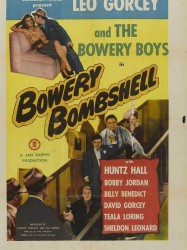
Bowery Bombshell (1946)
, 1h5Réalisé par Phil Karlson
Genres Comédie
Acteurs Leo Gorcey, Huntz Hall, Bobby Jordan, William Benedict, Sheldon Leonard, David Gorcey
Rôle Bobby
Note62%





Sweet Shop owner Louie needs to raise $300. The Boys try to sell their car to raise the money, but are unable to because the car falls apart when they try to show it to a prospective buyer. They decide to go to the bank and take a loan out on it, but just as they arrive the bank is robbed. The robbers bump into them and drop the bag full of the stolen money. As Sach picks up the bag to return it to the robber, Cathy, a photographer, takes his photo.
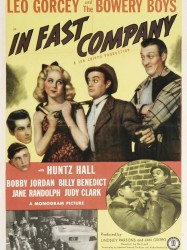
In Fast Company (1946)
, 1h3Réalisé par Del Lord
Origine Etats-Unis
Genres Comédie
Acteurs Leo Gorcey, Huntz Hall, Bobby Jordan, William Benedict, David Gorcey, Bernard Gorcey
Rôle Bobby
Note60%





Les Bowery Boys viennent à la rescousse quand une compagnie de taxi corrompu met la pression sur plusieurs pilotes indépendants.

Live Wires (1946)
, 1h4Réalisé par Phil Karlson
Genres Thriller, Comédie, Action, Policier
Acteurs Leo Gorcey, Huntz Hall, Bobby Jordan, William Benedict, Pamela Blake, Claudia Drake
Rôle Bobby
Note61%





Slip Mahoney has trouble keeping a job. Each one he finds leads to an altercation and he loses it, disappointing his sister whom he lives with. Eventually Sach helps him obtain a job with the District Attorney where he finds some success. Through a series of events, Slip and Sach help capture several notorious gangsters, including one that was about to flee the country with his sister.

Mr. Hex (1946)
, 1h3Réalisé par William Beaudine
Genres Comédie
Thèmes Sport, Arts martiaux, La boxe
Acteurs Leo Gorcey, Huntz Hall, Bobby Jordan, William Benedict, Gabriel Dell, David Gorcey
Rôle Bobby
Note59%





The boys are trying to raise money for their friend Gloria. She has to give up her aspiring singing career in order to stay home and take care of her sick mother. Slip comes up with the idea to hypnotize Sach into thinking he is an unbeatable fighter so that they can enter him into a contest to win $2,500. Meanwhile, Gabe brokers a deal with a crooked nightclub owner to give Gloria the big break she has been waiting for. The nightclub owner then hires a ringer to fight Sach as well as his own hypnotist to counter Slip's control over Sach in order to collect a fortune from everyone who has bet on Sach.
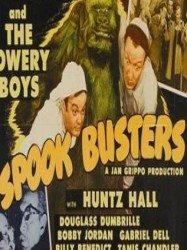
Spook Busters (1946)
, 1h8Réalisé par William Beaudine
Genres Comédie, Comédie horrifique, Horreur, Policier
Thèmes Fantômes, Comédie horrifique
Acteurs Leo Gorcey, Huntz Hall, Bobby Jordan, William Benedict, Gabriel Dell, David Gorcey
Rôle Bobby
Note59%





All of the boys have just graduated from school where they learned exterminating, except for Sach who flunked out. They set up their new business in a corner of Louie's Sweet Shop and quickly get a job to remove ghosts from an old abandoned mansion. Upon arrival they discover weird events taking place, such as lights turning on when a match is lit, and a disappearing organ. Soon they discover that these events are not the actions of ghosts, but of a mad scientist who is conducting illegal experiments in the basement.
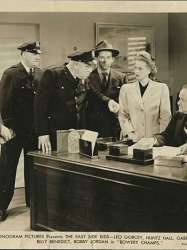
Bowery Champs (1944)
, 1h2Réalisé par William Beaudine
Origine Etats-Unis
Genres Comédie, Action
Acteurs Leo Gorcey, Huntz Hall, Gabriel Dell, William Benedict, Bobby Jordan, Buddy Gorman
Rôle Bobby Jordan
Note61%





After she files for divorce from nightclub owner Tom Wilson (Wheeler Oakman), former Broadway star Gypsy Carmen (Evelyn Brent) demands that he return the securities that she owned before their marriage. When Wilson claims that the securities are missing, Gypsy pulls a gun from her purse and aims it at him. At that moment, a gun is fired through the window of his house. Tom falls dead and Gypsy flees in panic.
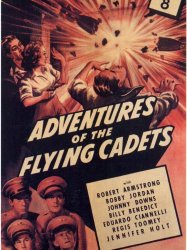
Réalisé par Ray Taylor, Lewis D. Collins
Origine Etats-Unis
Genres Guerre, Aventure
Thèmes Transport, Aviation, Politique, Forces armées des États-Unis
Acteurs Johnny Downs, Bobby Jordan, Ward Wood, William Benedict, Eduardo Ciannelli, Regis Toomey
Rôle Jinx Roberts
Note60%





Flying students Danny Collins (Johnny Downs), "Jinx" Roberts (Bobby Jordan), "Scrapper" McKay (Ward Wood) and "Zombie" Parker (William Benedict) are suspected of a series of murders perpetrated by engineer, Arthur Galt (Robert Armstrong) operating as a Nazi agent known as the Black Hangman. He has disposed of several people who accompanied him on an expedition which located lost helium deposits in Africa.
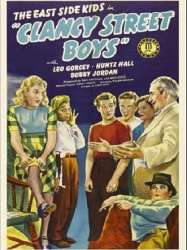
Clancy Street Boys (1943)
, 1h6Réalisé par William Beaudine
Genres Comédie
Acteurs Leo Gorcey, Bobby Jordan, Huntz Hall, Noah Beery Sr., Benny Bartlett, Ernie Morrison
Rôle Danny
Note60%





Much to the dismay of Mugs McGinnis (Leo Gorcey), everyone in his East Side Kids gang (as well as the rival The Cherry Street Gang) gets to smack his rear end eighteen times in celebration of his eighteenth birthday. His mother Molly (Martha Wentwroth) then becomes distraught when she gets a letter from his "uncle" Pete Monahan (Noah Beery), a rancher friend of his late father, stating that he will soon visit them in New York. Molly explains to her only child that ever since his father lied to Pete that he had seven children, Pete has been sending birthday checks for each child. Pete is unaware that the McGinnises are so poor that they could never afford to return the checks.
 Connexion
Connexion



